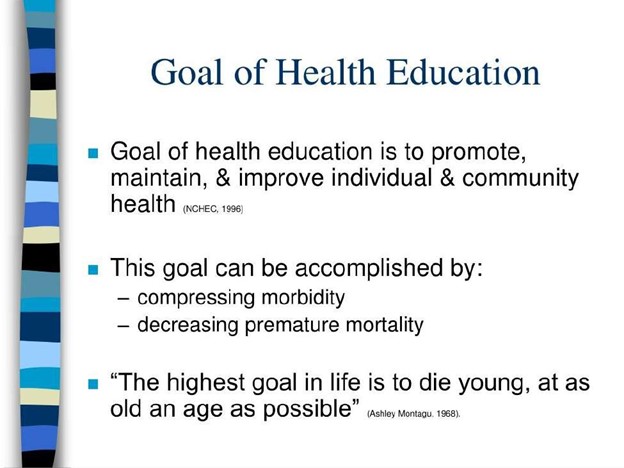Which of the following are goals of health education?
Improved health status.
All of the options.
Empowerment.
Change behavior.
The Correct Answer is B
The goals of health education include improved health status, empowerment, and behavior change.
Health education aims to help people improve their health in all stages of life and make better health decisions.
It also strives to minimize the occurrence of life-threatening illnesses and fight common misconceptions that affect people’s health.

Choice A is incorrect because it only includes improved health status while there are other goals of health education.
Choice C is incorrect because it only includes empowerment while there are other goals of health education.
Choice D is incorrect because it only includes behavior change while there are other goals of health education.
Nursing Test Bank
Naxlex Comprehensive Predictor Exams
Related Questions
Correct Answer is D
Explanation
The main concept of Pender’s health promotion model is that individuals generally engage in behavior that is likely to result in a positive outcome.
Pender’s model focuses on three areas: individual characteristics and experiences, behavior-specific cognitions and affect, and behavioral outcomes.
The model suggests that individuals will engage in health-promoting behaviors if they believe that the behavior will lead to a positive outcome.
Choice A is not the answer because behavior change is not a one-dimensional effect according to Pender’s model.
Choice B is not the answer because while a perceived threat to health can motivate individuals to take action, it is not the main concept of Pender’s model.
Choice C is not the answer because while individuals may change their behavior at different rates, it is not the main concept of Pender’s model.
Correct Answer is C
Explanation
Primary prevention aims to prevent disease or injury before it ever occurs by preventing exposures to hazards that cause disease or injury, altering unhealthy or unsafe behaviors that can lead to disease or injury, and increasing resistance to disease or injury should exposure occur.
Applying sunscreen prior to walking on the beach is an example of primary prevention because it helps prevent skin damage from sun exposure.
Choice A is incorrect because tertiary prevention aims to soften the impact of an ongoing illness or injury that has lasting effects.
Choice B is incorrect because secondary prevention aims to reduce the impact of a disease or injury that has already occurred.
Choice D is incorrect because maximizing dietary intake is not related to the application of sunscreen.
Whether you are a student looking to ace your exams or a practicing nurse seeking to enhance your expertise , our nursing education contents will empower you with the confidence and competence to make a difference in the lives of patients and become a respected leader in the healthcare field.
Visit Naxlex, invest in your future and unlock endless possibilities with our unparalleled nursing education contents today
Report Wrong Answer on the Current Question
Do you disagree with the answer? If yes, what is your expected answer? Explain.
Kindly be descriptive with the issue you are facing.
